Operation Iron Swords - Day 218 - 11 May 2024
“At any point, Hamas could have ended this burgeoning tragedy to
surrender and release every hostage. …
Hamas instigated and owns this humanitarian catastrophe.”
Sen. John Fetterman (D-PA)
Contents |
|
NEW - War Termination NEW - Operations NEW - Operations - Gaza NEW - Operations - Judea-Samaria NEW - Operations - Lebanon NEW - Operations - Syria / Iraq NEW - Operations - Yemen UPDATED - Operations Maps NEW - By-Standers NEW - Axis of Resistance NEW - Allied for Democracy UPDATED - By the Numbers |
The US State Department released a report criticizing Israel's conduct of its war against Hamas in Gaza, but without finding specific violations that would require a military aid ban. The Israeli military faced increased international scrutiny as its military operation in Gaza enters its eighth month, claiming the lives of more than 34,000 Palestinians, mostly civilians. In February, President Joe Biden ordered the Pentagon and the State Department to “obtain certain assurances” over Israel’s use of US-made weapons and to report back to Congress. A summary of the findings was released to the public.
The report claimed that the “nature of the conflict in Gaza makes it difficult to assess or reach conclusive findings on individual incidents,” and that Washington has yet to obtain “complete information to verify whether US defense articles” resulted in civilian deaths. “Nevertheless, given Israel’s significant reliance on US-made defense articles, it is reasonable to assess that defense articles… have been used by Israeli security forces since October 7 in instances inconsistent with its IHL [international human law] obligations or with established best practices for mitigating civilian harm,” the report added.
Israel has “undertaken steps” to mitigate collateral damage, but the “results on the ground, including high levels of civilian casualties, raise substantial questions as to whether the IDF is using them effectively in all cases,” the summary reads. Biden admitted earlier this week that at least some Palestinian civilians in Gaza have been killed by US-made bombs – and has vowed to halt the supply of any weapons that Israel could use in a major military operation in the southern city of Rafah.
Israeli actress Wonder Woman star Gal Gadot encouraged Israel’s Eurovision representative to remain steadfast amidst tens of thousands protesting against the country’s participation in the song contest due to its actions in Gaza. Gadot shared that some of her films faced boycotts in various nations due to her support for the Israeli government. Nonetheless, she reassured singer Eden Golan by expressing that such opposition holds no significance and asserted that “haters are the ones losing.” In a defiant stance, Gadot urged Golan to disregard the negativity, stating, “Let the haters hate.”
Climate activist Greta Thunberg was seen being detained by local police, according to a photo taken by Reuters. Loud boos could be heard from the crowd in footage of Israeli singer Eden Golan rehearsing on Saturday, ahead of the Eurovision final in Sweden, according to Israel’s public broadcaster. The 20-year old Israeli vocalist had become the focus of protests by pro-Palestine demonstrators, who want Israel removed from the competition due to the Gaza war.
Swiss rapper Nemo won this year's Eurovision Song Contest with his song "The Code", which talks about his journey of self-discovery, becoming Eurovision’s first nonbinary champion. Israel’s Eden Golan placed fifth Saturday night at the Eurovision Song Contest 2024 amid boos and protests from critics of her country and its prosecution of the war in Gaza. Croatia’s Baby Lasagna came second with “Rim Tim Tagi Dim.” Ireland’s Bambie Thug, who has been an outspoken critic of Eurovision allowing Israel to compete this year, ended their performance by saying: “Love will always triumph over hate.”
War Termination
Hostage and truce talks have not completely failed and efforts to reach an agreement continue alongside the military operation in Gaza, news site Ynet has reported, citing Israeli officials familiar with the negotiations. The sources stressed that talks will resume “if there are answers from Hamas that we can work with.” Negotiations appeared to collapse in Cairo this week after Israel said a draft ceasefire deal brokered with mediation from Egypt and Qatar, which Hamas claimed on Monday to have accepted, included several conditions fundamentally different to those Israel had agreed to earlier. But internationally-brokered ceasefire talks appeared to falter, with Hamas saying that Israel's rejection of the truce proposal "which it had accepted" had returned matters to square one. Israel said that the terms of the agreement did not meet its demands, while the US State Department stated that Hamas “did not agree” to the agreement but rather submitted proposals as part of the negotiation processes. Hamas also indicated that it is reconsidering its negotiating policy. She did not clarify whether this meant that she would tighten her conditions for reaching an agreement, but she said that she would consult with the leaders of the other Palestinian factions allied with her. Israel says it wants to reach an agreement under which the hostages are released in exchange for the release of Palestinian detainees from Israeli prisons, but it is not ready to end the military attack. The government of Israeli Prime Minister Benjamin Netanyahu is under increasing pressure from several countries, including its ally the United States, due to its military campaign.
Operational Update
Military and strategic expert, Colonel Hatem Karim Al-Falahi, believes that the Israeli army is suffering from a real problem in the military operations it is carrying out in various regions of the Gaza Strip , at the strategic and operational levels.
Colonel Al-Falahi said - in the military analysis on Al Jazeera - that there is a very major flaw in the Israeli strategy that was developed to deal with the Islamic Resistance Movement ( Hamas ), and the evidence is that it was not eliminated as the occupation leaders claimed, and the prisoners held by the Palestinian resistance were not released. Which means that the military goals set by the occupation army were achieved very little.
He referred to the statement of Israel Ziv, the former director of the Operations Division in the Israeli army and commander of the Gaza Division, in which he said, "The political leadership has made Israel turn into an uncontrollable thug in the region as a result of the killing and destruction in Gaza." He adds, "Prime Minister Benjamin Netanyahu is striking everywhere and in all directions without achieving anything."
Regarding the increase in the pace of resistance operations in the recent period, the military and strategic expert links it to the Israeli army’s incursion into Rafah, south of the Gaza Strip, and its incursion into the northern axis of the Strip, especially in Zaytoun in central Gaza City. He confirms that the American army provided advice to its Israeli counterpart that remaining inside the cities of Gaza would cause it great exhaustion, which is what happened to the American forces in Iraq after 2003.
Colonel Al-Falahi said that, in accordance with American advice, the occupation forces withdrew from the Khan Yunis area , south of the Gaza Strip, and from the rest of the areas, except for the Netzarim axis . He noted that the Israeli army remaining inside the Gaza Strip would incur very heavy losses. He pointed out - in the same context - that the resistance brigades in the city of Rafah are still fully equipped and well fortified, and can use tunnels and construction properly to achieve their goals.
The Israeli newspaper Yedioth Ahronoth reported - from sources in the army - that the Hamas movement will remain in Rafah even if military operations continue in the entire city, and that there are no magic solutions.
Operational Update - Gaza
Israel’s military has said that so far, about 300,000 Gazans have moved towards what it calls an expanded humanitarian area in Al-Mawasi. On Saturday, the IDF expanded the number of zones in eastern Rafah that need to be evacuated due to the ground operation. Residents of Rafah told Reuters that the new evacuation orders issued by the army included areas in the city center, which leaves no doubt that Israel intends to expand its ground attack there.
Despite American pressure and the concerns expressed by residents, relief organizations, and many countries, Israel says it will go ahead with the incursion into Rafah, where more than a million people have been displaced as a result of the war that has been going on for seven months. Israeli tanks took control of the main road separating the eastern and western sides of Rafah on Friday, effectively encircling the eastern side in an attack that prompted Washington to suspend the delivery of some military aid to its ally. Israel says that it will not be able to achieve victory in this war without eliminating thousands of Hamas militants who it believes are still present in Rafah.
The IDF issued evacuation orders for civilians around Jabalia, northern Gaza Strip, due to Hamas reconstituting militarily there, after five soldiers were killed in fighting over the weekend. The Israeli force was ambushed east of Jabalia, and helicopters landed to evacuate the wounded and dead. The force was lured into a building, which was then detonated. The Israeli military issued a statement saying that it is carrying out strikes and operating against Hamas targets in northern Gaza's Jabaliya. “Following attempts by Hamas to reassemble its terrorist infrastructure and operatives in Jabaliya, the IDF has called on the civilian population of Jabaliya and the surrounding areas to temporarily evacuate to shelters in western Gaza City,” the Israeli military said. "This is being done in accordance with international law to reduce harm to the civilian population and move civilians away from the combat zone. The calls for the temporary evacuation are being communicated to residents through flyers, SMS messages, phone calls and media broadcasts in Arabic."
Another announcement was made by Lt. Col. Avichay Adraee, the Israel Defense Forces’ Arabic-language spokesman. In a Twitter post, he also published a list of the new zones that need to be evacuated as Israel continues with its operation against Hamas in the city in the southern Gaza Strip. “Hamas is attempting to rebuild its capabilities in the area, and the IDF will act very aggressively against terrorist organizations in the area you are in, so anyone who is in these areas is putting themselves and their families at risk,” the statement read.
The IDF said its troops have located weaponry inside a clinic in Zeitoun in northern Gaza, where it uncovered large arms caches, and in the last several hours has eliminated “terrorists” in close-quarters combat. In one of the raids, they said “the troops uncovered AK-47 rifles, military vests, and military equipment that were hidden inside a clinic.” The IDF added that over the past day, the Israeli Air Force “struck tens of terror targets throughout the Gaza Strip”, including military structures and “terrorist infrastructure.” The IDF went on to say that troops are continuing operational activity on the Gazan side of Rafah Crossing, “uncovering numerous underground tunnel shafts and eliminating armed terrorists.”
The Israeli army spokesman, Daniel Hagari, said in a press conference, on Saturday, that “Army forces are conducting an operation in the Al-Zaytoun neighborhood in the Gaza Strip, and have found...an important underground road,” according to what Al-Hurra’s correspondent in Jerusalem reported. Hagari added that Israeli fighter jets "attacked terrorist targets around Jabalia, north of the Gaza Strip."
He stressed that "as part of the army's preparations to operate in the region, the temporary evacuation of Jabalia residents has begun." Hagari added that the Israeli forces operating in Jabalia "prevent Hamas from rebuilding its military capabilities there," as he claimed. He said: "In the past weeks, we have monitored attempts by Hamas to rebuild its military capabilities in Jabalia. We are working there to eliminate those attempts."
Hamas says that the US bears full responsibility for the worsening of the situation on the ground for the Palestinian civilians, as it continues to support Israel. “We hold the US administration and its President Biden fully responsible for the escalation of these crimes against civilians, including children, women and the elderly, by continuing to provide cover for Zionist fascism to continue its crimes,” Hamas said in a statement, amid ongoing Israeli attacks across Gaza, including in Rafah in the south and Jabalia and Zeitoun in the north.
Rybar reported that following the Israeli cabinet's decision to deepen the ground operation in the southern Gaza Strip, the IDF command expanded the civilian evacuation zone from the eastern neighborhoods of Rafah to the north of the Palestinian enclave. According to the Israel Defense Forces press service, so far about 300 thousand people have left the city and went to the humanitarian zone of Al-Mawasi. The figure differs from the data of the UN agency for assistance to Palestinian refugees (UNRWA), according to which the number of those who fled amounted to about 110 thousand. In this regard, the IDF has suspended the offensive, although the fighting has not stopped: the Israelis are carrying out mop-up operations in and around the captured areas, while militants are conducting ambushes. In addition, the IDF has been conducting air and artillery strikes on Rafah since the morning ahead of the resumption of offensives. In response, Palestinian factions shell Rafah, Kerem Shalom and Be'eri checkpoints.
"Formal evacuation of civilians will eventually allow the current ultra-Orthodox Israeli government to get the go-ahead from partner states, especially the US, to take over the Philadelphi Corridor. And after observing the necessary politeness, the Israelis will be able to resume the offensive."
The Washington Post suggests that the US is providing “sensitive intelligence” to Israel’s military for targeting Hamas officials in Gaza, with the attached condition that it would refrain from launching a full-scale assault on Rafah city, which is full of civilians. According to the informed sources cited by the newspaper, other incentives to avoid a major operation in Rafah may include divulging information about the location of Hamas’s extensive tunnel network.
According to the newspaper, American officials also offered to help provide thousands of shelters so that Israel can build tent cities, as well as help build food, water and medicine delivery systems, so that Palestinians evacuated from Rafah can have a suitable place to live, the officials said. Americans who refused to reveal their identities. The newspaper explained that Biden and his senior aides have made such offers over the past few weeks in the hope of convincing Israel to implement a limited and more targeted operation in southern Gaza City, where about 1.3 million Palestinians are taking shelter after they fled other parts of Gaza on Israeli orders.
The newspaper reported that US administration officials, including experts from the US Agency for International Development, told Israel that it would take several months to safely transfer hundreds of thousands of Palestinians who are now living in dilapidated and unsanitary conditions in Rafah. Israeli officials disagree with this assessment. Biden's aides stress to their Israeli counterparts, according to the newspaper, that Palestinians cannot simply be transferred to barren or bombed parts of Gaza, but that Israel must provide basic infrastructure, including shelter, food, water, medicine and other necessities, so that those being... To prevent them from receiving assistance for better living conditions and not simply being exposed to further starvation or disease.
Experts from various sectors of the US government are advising their Israeli counterparts in great detail on how to develop and implement such a humanitarian plan, down to the number of tents and the amount of water needed for specific areas, according to several sources familiar with the matter told the newspaper. Aid groups said that safely evacuating people from Rafah was almost impossible given the conditions in the rest of Gaza. The newspaper believes that these unusually detailed and sensitive talks highlight the enormous risks facing both Israel and the United States as Netanyahu prepares to invade Rafah, the last city in Gaza that was not destroyed by Israeli attacks. The Washington Post noted that Israel has become increasingly isolated during the seven-month Gaza war, which resulted in the deaths of nearly 35,000 Palestinians, and Biden has been subjected to massive criticism at home and abroad for his support for it.
Israeli leaders assert that they must invade Rafah to finish the mission of eliminating Hamas, which attacked Israel on October 7, killing about 1,200 people. But the newspaper reported that destroying the city's extensive tunnel network, where many Hamas leaders and militants are based, would expose tens of thousands of Palestinian civilians to danger. This prompted American officials, according to the newspaper, to urge a "large-scale, inordinately complex evacuation plan" as the best option, even as they urgently pushed for a ceasefire between Israel and Hamas. “The aid community generally is very skeptical there’s any safe way to relocate people out of Rafah,” said Jeremy Konyndyk, president of Refugees International and a former USAID official in the Obama administration. “I’ve been really concerned about the U.S. line on this — that the line has not been, ‘End the war and don’t go into Rafah.’ The line has been to find a way to safely evacuate people, and that presumes that’s a possible thing.”
A senior US administration official told the newspaper: “We have serious concerns about the way Israel has pursued this campaign, and it could all culminate in Rafah.” American officials are now working closely with Egypt to find and cut tunnels that cross the Egypt-Gaza border in the Rafah area, which Hamas has used to replenish its military resources, according to two people familiar with the discussions. For the Washington Post. According to the newspaper, the American offers came during negotiations that took place over the past seven weeks between senior American and Israeli officials regarding the size and scope of the operation in Rafah. But she indicated that it is not yet clear whether Israel will respond to repeated American warnings not to launch a large-scale ground invasion.
Israel is continuing its “precise operation against Hamas in Rafah as part of our efforts to achieve an enduring defeat of Hamas and bring all our hostages home,” IDF spokesperson Daniel Hagari said in an early Sunday statement. “Since the start of our precise operation against Hamas in Rafah we have eliminated dozens of terrorists, exposed underground terror tunnels and vast amounts of weapons,” he stated, insisting that Israel’s war is “against Hamas, not against the people of Gaza.”
Some 150,000 people have so far fled Rafah seeking safety amid increasing Israeli attacks, the UN agency for Palestinian refugees (UNRWA) has estimated, according to spokeswoman Louise Wateridge. “Everywhere you look now in west Rafah this morning, families are packing up. Streets are significantly emptier,” Wateridge wrote on X (formerly Twitter), adding that the IDF issued evacuation orders “towards central Rafah” from more areas both in south Gaza and Jabalia in North Gaza. “UNRWA estimates 150,000 people have now fled Rafah.”
Operational Update - Judea-Samaria
Operational Update - Lebanon
Operational Update - Syria / Iraq
Operational Update - Yemen
Maps
|
All maps are lies. “Not only is it easy to lie with maps, it is essential,” wrote cartographer Mark Monmoneir in his book How to Lie with Maps. He showed that condensing complex, three-dimensional spaces onto a two-dimensional sheet of paper [in old days] is bound to be reductive. But it is impossible to comprehend the war in Gaza without reference to maps, otherwise the entire conflict is reduced to an endless series of meaningless acts of random violence and the suffering of civilians. The first characteristic of guerrilla warfare is the loss of a front line. Evidently, different mappers have different ideas of how to depict the war in Gaza, notably those that seek to depict Israeli progress in the ground campaign. Part of the problem is latency. The news that forms the basis of the maps takes time to filter out to mappers, and the cartographers take time in crafting their maps, and it takes time to curate them. These processes are uneven among mappers, so their maps may differ in detail. Probably there is some ideological bias, or at least thematic apperception, which is understandable in wartime. It may come as no surprise that al-Jazeera maps depict rather less Israeli territorial progress than other sources. Finally, there remains the epistemological question of just exactly what are the colored in areas depicting. Naively, this might be understood as areas of Israeli control, that are no longer contested by the HAMAS. Or possibly these are areas of Israeli presence, in many of which the possibility of an RPG-wielding HAMAS militant popping out of a tunnel unexpectedly remains a live possibility. With the "zero-range" combat characterized by small unit tactics on both sides, maps may be prey to a fallacy of misplaced concreteness.
|
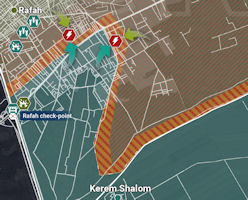
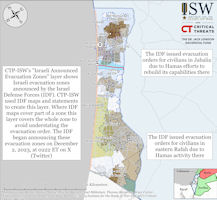
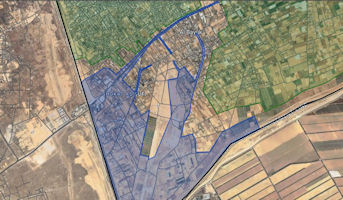

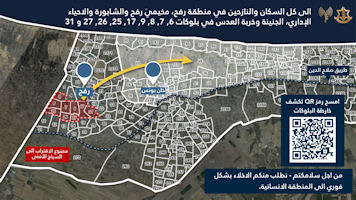

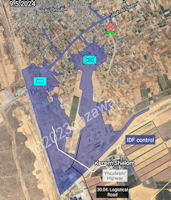

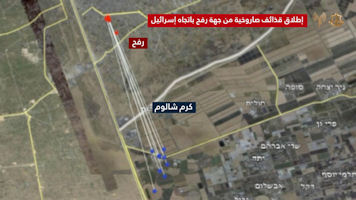
Bystanders
The UN World Food Program (WFP) said on X (formerly Twitter) on Friday that the southern border crossings of Gaza have not seen aid in three days. It reported that only a single bakery is operating in Rafah. “Without a reopening of access, WFP’s operations will go into standstill while families run out of food,” the statement said.
United Nations Secretary-General Antonio Guterres renewed his call on Sunday for an “immediate ceasefire” between the Islamic Resistance Movement ( Hamas ) and Israel in the Gaza Strip , demanding the “unconditional release” of all hostages. Guterres said in a recorded speech broadcast during an international donor conference in Kuwait, "I reiterate my call - the world's call - for an immediate ceasefire on humanitarian grounds, the unconditional release of all hostages, and an immediate increase in humanitarian aid." The Secretary-General of the United Nations stressed that the war in Gaza is causing horrific human suffering. At the beginning of this month, Guterres urged Hamas and Israel to conclude an agreement that would put an end to the war through negotiations. Last March, Guterres visited the Rafah crossing on the Egyptian side, and during the visit he called for a ceasefire to allow more aid to enter. In a related context, the High Representative of the European Union for Foreign Affairs and Security Policy, Josep Borrell , said , "It is unacceptable to force civilians in Rafah to go to unsafe areas." Borrell added, "Israel is obligated under international law to provide protection for civilians." He stressed that "it is unacceptable to force civilians in Rafah to move towards unsafe areas," which was emphasized by Spanish Foreign Minister Jose Manuel Albarez when he considered the deportation of thousands of Palestinians unacceptable, indicating that the military operation of the Israeli occupation in Rafah must be stopped. Despite mounting international warnings about expanding military operations in Rafah, the Israeli occupation army called yesterday, Saturday, for the “immediate” displacement of residents of neighborhoods located in the heart of the city, thus expanding its operations that began in the east of the city. Sylvain Groulx, emergency coordinator for Doctors Without Borders in Gaza, said: “When more than two-thirds of hospitals or medical facilities in Gaza are completely or partially destroyed, it will be difficult to save them. Providing the population with the basic health services they need will become even more difficult.” difficulty".
The director of the Kuwait Specialized Hospital in Rafah, Suhaib Al-Hams, also issued a call to protect the hospital in light of a situation that is becoming “more and more catastrophic.” He said in a video clip distributed to journalists on Saturday: “Now the Kuwait Specialized Hospital is unfortunately within the area threatened by evacuation.” He added, "We, from the midst of bombing and destruction, demand that Kuwait Specialized Hospital provide international protection from the Red Cross and the World Health Organization. This hospital is the only hospital, the only refuge for the sick and injured to seek refuge. There is no other place to seek refuge."
France said that the Israeli operation in Rafah “threatens to cause a catastrophic situation for the civilian populations of Gaza,” and urged West Jerusalem to “cease this military operation without delay and to return to the path of negotiations.” “France calls on Israel to immediately reopen the Rafah crossing point towards Egypt, which is essential both for access of humanitarian aid to the civilian population and to allow the most vulnerable people to leave the Gaza Strip,” the French Foreign Ministry added in a statement.
Axis of Resistance
Hamas leader Yahya Sinwar is not hiding in Rafah, The Times of Israel reported on Friday citing two officials familiar with the matter. The Hamas leadership is still a key war target for Israeli Prime Minister Benjamin Netanyahu. The Israel Defense Forces have already killed Hamas military wing deputy commander Marwan Issa, believed to be the group’s No. 3 figure in Gaza. They have also eliminated other senior commanders in recent months. But Sinwar and his deputy, military wing chief Mohammed Deif, have remained elusive. The two officials speaking to The Times of Israel were unable to name the exact whereabouts of Sinwar, but they cited recent intelligence data that indicated the Hamas leader was in underground tunnels in the Khan Younis area, some five miles north of Rafah. A third official asserted that Sinwar is still in Gaza.
Despite its dispersion and despite the fact that Israel outnumbers it in numbers and weapons, the Islamic Resistance Movement ( Hamas ) is far from defeated, which is confirmed by Israel’s announcement yesterday, Saturday, that it has diverted part of its forces to suppress the movement’s fighters in northern Gaza . That's the conclusion reached by Beverly Milton Edwards, co-author of the forthcoming book "Hamas" and a non-resident fellow at the Middle East Council for Global Affairs in Doha.
Seven months after the start of this war, Edwards believes that Israel has failed to destroy Hamas as a military and political force, nor has it been able to eliminate the main leaders who planned the attacks of October 7, 2023, even if that had happened (even partially). All indications point to the emergence of new battle-hardened leaders to replace those who disappeared. In the first weeks and months of the war, as the author explains in her article in the British newspaper The Times, few experts expected that the organization’s military wing, the Izz al-Din al-Qassam Brigades , would survive the inevitable Israeli attack.
She adds that to confront the Israeli attack, Hamas has recruited thousands of dedicated fighters who see death in battle as a glory that turns them into martyrs and guarantees them paradise, not to mention the contribution of that sacrifice to freedom from siege and occupation.
Although Israeli army operations led to the elimination of some Qassam leaders, this often came at a heavy cost to civilians, as happened in the air attack on the Jabalia refugee camp on October 31, 2023, which Israel said led to the killing of Ibrahim Bayari. The Qassam commander in the camp, which also left a thousand Palestinians dead and wounded, according to the Ministry of Health in Gaza, as the author explains.
Edwards adds that luring Israeli soldiers into Gaza has always been a tactical goal for Al-Qassam, as its fighters believe that they can maintain their superiority due to their knowledge of the field and their use of narrow alleys, hidden entrances, orchards, and sand dams. Under the title: “ Rafah is the End of the Game,” the writer pointed out what Israel did last week in expanding its attack on Rafah, despite explicit objections from the administration of US President Joe Biden and global criticism warning of the killing of tens of thousands of Palestinians in the war.
Edwards added that destroying Hamas will remain the goal, but in the process the entire population of Gaza is approaching starvation, and in Rafah itself, which UNICEF has described as a “city of children,” residents, refugees and aid workers have lost hope. What is surprising, according to the author, is that the support enjoyed by Hamas in Gaza is still relatively undiminished, and the majority of Gaza residents whose opinions were recently polled still believe that Hamas will win the war. The writer explained this by saying that the residents of Gaza know, first of all, that the destruction that befell their strip was caused by Israel, not Hamas, and secondly, and in contrast to some complaints about Hamas in the past, Hamas fighters have shown how extremely committed they are to defending Gaza.
The Qassam Brigades in Gaza, contrary to Israeli claims, are not seen as hiding in tunnels and afraid to fight. The Qassam Brigades in Gaza, contrary to Israeli claims, are not seen as hiding in tunnels and fearing combat. Moreover, whenever Israel targets and kills family members of the Hamas leadership, including their children and grandchildren, or destroys their homes; This strengthened shared solidarity and collective grief. The writer warned that Prime Minister Benjamin Netanyahu's declared goal of killing the current Hamas leaders will not solve the problem, explaining that Hamas has always had the ability to renew and recruit the next generation of fighters ready to confront the Israeli enemy, citing in this regard what the movement's founder Sheikh Ahmed Yassin said : “Behind every martyr is a thousand martyrs ready for battle.”
On the other hand, the writer highlighted that the image of the Israeli army as an invincible army has been greatly damaged. A number of Israeli security leaders have fallen, and the positions of others in the Israeli political and military establishment have become more dangerous, as they are threatened with possible arrest orders on charges of committing war crimes from the International Criminal Court . Equally important, the Israeli public appeared to be running out of patience with the war. As for Hamas, it will not submit or surrender. It is capable, as it has always proven, of fierce resistance. According to many sources, it still maintains at least 5 active brigades, now divided into mobile guerrilla units, in Rafah alone. Amidst the rubble, and in the deep tunnels inside Gaza, survival despite the difficulties is, for Hamas, a victory in itself, according to what the British expert concluded.
The Islamic Resistance Movement ( Hamas ) said that Israel's announcement of the start of a military operation in Jabalia, north of the Gaza Strip , coinciding with its incursions into the Zaytoun neighborhood and Rafah, confirms its insistence on moving forward "in the war of extermination." In a statement, the movement held the US administration and President Joe Biden fully responsible for the escalation of these crimes against civilians. The movement called on the international community and the United Nations to leave what it called the box of timid positions, and to put pressure to stop the aggression.
In a separate statement, Hamas warned of a humanitarian catastrophe and the worsening state of famine in the Gaza Strip as a result of the Israeli occupation army’s continued control of the Rafah crossing and its closure for the fifth day in a row. Hamas said that closing the crossing disrupted the arrival of humanitarian and medical aid to the Palestinians, in addition to stopping the exit of the wounded to receive treatment abroad. The movement called on the international community and the United Nations to take urgent action to stop this humanitarian catastrophe, and to take the necessary measures to stop the Israeli aggression against Gaza.
Allied for Democracy
Crackdowns on Gaza campus protests have continued as graduation season kicks off across the US. Police arrested dozens of pro-Palestine protesters on Friday, as they broke up encampments at university campuses. Some 33 people were arrested on suspicion of “defiant trespass” at the University of Pennsylvania, as police took steps to dismantle a tent camp that has been in place for more than two weeks. Campus officers and police cleared the camp of more than 40 tents in a pre-dawn raid, throwing signs and flags into garbage trucks, a campus newspaper reported. Ten protesters were also arrested at the Massachusetts Institute of Technology, after riot police arrived on the Cambridge campus outside Boston at 4am local time, the university’s president said.
Operation Iron Swords - By the Numbers
- 1,900,000 IDPs in Gaza
- 78,641 Gazans injured, 28% adult male
- 70,000 tons of explosives dropped on Gaza
- 70,000 Gaza housing units completely destroyed
- 70,000 Israeli IDPs from Lebanon border
- 45,000 bombs dropped in Gaza
- 45,000 Gazans killed, including buried under rubble
- 34,971 Gazans martyred
- 33,000 Gaza targets attacked
- 20,528 Palestinians in Israeli prisons [Haaretz, 20 Mar 2024]
- 15,140 Israelis injured [i24 TV]
- 15,000 rockets launched from Gaza
- 14,520 Gazan children martyred
- 13,000 HAMAS combatants killed [N12]
- 13,000 HAMAS combatants killed [IDF]
- 11,000 arrested by Israelis in the West Bank in 2023
- 10,000 Gazans missing under the rubble
- 9,920 Gazan women martyred
- 9,400 Palestinians in Israeli prisons
- 9,000 IDF needing psychological assistance
- 8,665 arrested by Israelis in the West Bank since Oct.7th
- 7,209 IDF injured admitted to rehabilitation [IDF]
- 6,800 IDF officers and soldiers injured [Channel 12]
- 6,000 HAMAS combatants killed [HAMAS]
- 5,500 IDF wounded [reports]
- 4,800 West Bank Palestinians wounded
- 4,700 sites targetted in Lebanon
- 3,850 wanted persons arrested throughout Judea and Samaria
- 3,600 administrative detainees
- 3,188 IDF wounded [IDF]
- 2,100 Gazan women are missing
- 1,609 terrorists killed on the first day
- 1,650 wanted persons arrested throughout Judea and Samaria affiliated with Hamas
- 1,160 Israelis killed on the first day
- 615 Israeli officers and soldiers killed since the start of the war
- 468 West Bank Palestinians martyred
- 364 people [including fighters] killed in Lebanon
- 267 Israeli officers and soldiers killed in Gaza
- 240 Hezbollah fighters killed in Lebanon
- 126 people recovered, including 91 Israelis, 11 bodies, and 24 foreign workers
- 116 living hostages in Palestinian custody
- 70 civilians killed in Lebanon
- 29 IDF deaths were caused by "friendly fire"
- 15 Israelis killed in the West Bank and Israel
Not every number is reported every day, so sudden jumps generally reflect reporting artifacts rather than actual upticks. Many of these numbers fluctate, up and down, with no apparent explanation. This list records the highest number reliably reported for each matter, under the theory that reality with catch up with reports, as is relentlessly the case.
Some reports claimed that the UN cut in half its earlier estimates of women and children killed in Gaza. Initially, they reported 9,500 women and 14,500 children killed, but later revised it to 4,959 women and 7,797 children on 08 May 2024. The UN acknowledged its inability to independently verify casualty figures. The seeming discrepancy is that HAMAS had about 10K KIA bodies on hand for which they do not have positive ID. It is possible to report the gender and approximate age without knowing the name of the deceased.

|
NEWSLETTER
|
| Join the GlobalSecurity.org mailing list |
|
|
|

